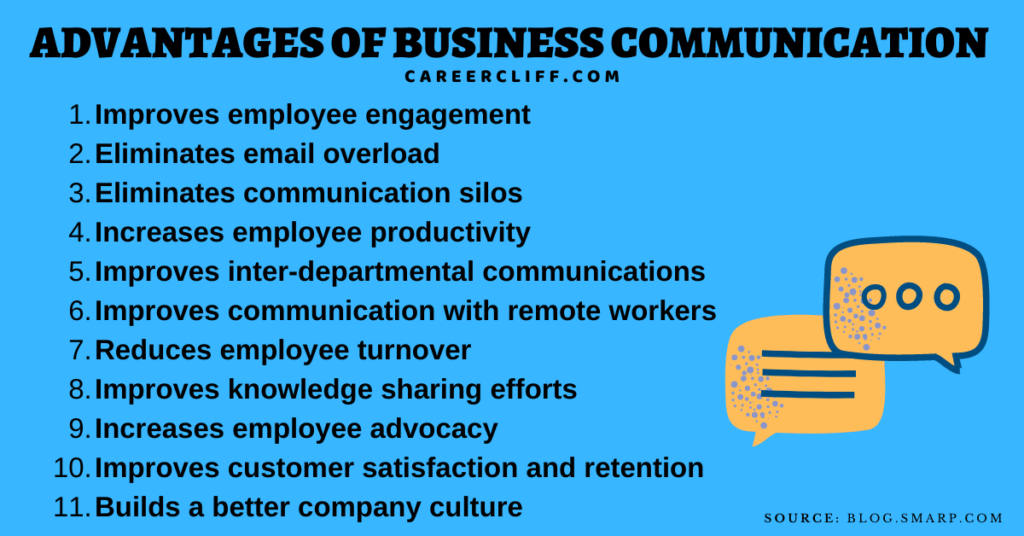
Table of Contents
- What Is the Definition of Business Communication?
- What Is the Significance of Business Communication?
- 7 Effective Business Communication Tips
- Key Takeaways
- Conclusion
- FAQs
Internal communication is considered a crucial success component in a majority of firms, yet only a small number of workers think their existing internal communication tools are effective in achieving business success.

Communication is essential to every kind of corporate environment. To maximize your chances of success, you must learn how to communicate effectively with others around you. It will be much simpler for you and your team members to collaborate more successfully on projects, solve issues more quickly, and achieve objectives more rapidly if you have good communication skills. This is when business communication tips can come in handy.
It is essential that you read this business communication guide if you are concerned with enhancing communication in your company. We have provided tips for improving communication processes that can be really helpful to any organization.
What Is the Definition of Business Communication?
Business communication refers to the process of exchanging information between individuals inside and outside a corporation. Employees and management engage with each other regularly in order to achieve organizational objectives via effective business communication. Its goal is to enhance business procedures, while simultaneously reducing mistakes.
What Is the Significance of Business Communication?
Effective corporate communication can have a positive impact on all parts of an organization’s operations. Communications professionals wear several hats in the workplace, and the following are a few of the most important.
- Assisting companies in establishing clear objectives and expectations
- Facilitating a smooth transfer from one project to another
- Increasing the quality of customer service
- Streamlining the organization’s activities
- Developing new and inventive concepts: when workers are given a chance to express their opinions, thoughts, and ideas, the business is better able to handle problems.

7 Tips for Effective Business Communication
There are many ways to improve business communication. But here are the most effective ones for you.
1. Conversation with a person, in person
Many apprehensions and uncertainties can be cleared up immediately in a face-to-face talk, which may not be possible over email or chat. Once an issue has been addressed, it is best to follow up with a letter that states, “As discussed…” to ensure the contract is final and that there are no misunderstandings.
When it comes to debating, reaching an agreement, or signing or contract, it is one of the most successful methods available. Furthermore, face-to-face communication aids in the development of trust between you and your colleagues.
2. Schedule a convenient time for discussions
This is a tried-and-tested tip for effective business communication. It is becoming more and more difficult for teams to communicate effectively, as firms go into remote working mode. Besides being distracted by their surroundings, remote workers must contend with technological challenges, time-zone conflicts, and an array of other obstacles.
When dealing with critical issues, it is necessary to establish a convenient location and time for all parties to speak. Whether you’re holding the meeting online or in person, everyone should agree on a common time and location. Maintain a regular, scheduled gathering to enhance communication channels. It is an important way to improve business communication.
3. Tell the truth without sugarcoating it
In addition to refusing to lie, leaders should not avoid having unpleasant dialogues. Occasionally, you may need to inform someone—an employee or a customer—that there is an issue with their work. Before leaping to conclusions, though, be careful to ask questions and pay close attention to the answers you are receiving.
After receiving further knowledge, your opinion of the issue may shift. In any instance, show courtesy to the other person, act fast to find answers, and choose the next steps. The objective of taking on difficult talks should be to reach a good conclusion.
4. Pay attention
The first suggestion for improving your corporate communication skills is to pay attention to what is being said. More than simply hearing what someone says, it entails hearing the tone of their voice and the emotions they are experiencing at the time they are saying anything.
When you listen to someone, it demonstrates that you care about them as a person, rather than as an employee or colleague. It will help build trust in your professional relationships, while also allowing you to have a deeper understanding of their point of view.
5. Respond within a reasonable timeframe
Here is another top tip for effective business communication. When responding to someone, you should attempt to answer within a fair length of time. The results of a recent survey revealed that 68% of workers report experiencing work delays as a result of waiting for information from others whom they have sought to contact many times before. The average amount of time spent waiting is 3.5 hours per week, per knowledge worker.
That is an extremely long period of time to wait before making any progress on a certain assignment, and it might have a severe impact on important business operations. According to a poll conducted by the Computing Technology Industry Association, 28% of workers cited poor communication as the most common reason for a project’s failure to meet its intended delivery date.

6. Be aware of your target audience
Communication in the workplace may be difficult and irritating at times, particularly when you don’t know about the communication preferences of those you are interacting with. Therefore, your top priority should be to figure out who exactly you’re communicating with. Knowing about their preferences, likes, and dislikes will help polish your communication strategy further.
7. Be curious and ask questions
In so many ways, the ability to ask questions is essential. By asking the correct questions, you may elicit vital feedback, demonstrate to the other person that you are paying attention, and ensure that you understand the situation thoroughly. When used in conjunction with great listening, asking questions may be quite useful in corporate communication.
It is possible to enhance a wide variety of communication abilities just by asking the right questions. You may get more accurate information, learn more, develop deeper connections, and manage your staff more efficiently by doing so.

Key Takeaways
- Establish and reassess the communication objectives according to the present status of communication in your organization.
- Identify everyone who is engaged in the procedures that enable your firm to perform its functions on a daily basis. This is an important tip for improving communication processes.
- Examine your team member’s requirements for communicating with one another and discover the mechanisms that will allow them to exchange information.
- Another way to improve business communication is to evaluate the most relevant tools and platforms that will permit the approaches that you have selected.
- Distribute this configuration in a transparent manner to the whole company.
Conclusion
Poor communication poses far too many dangers for a company to keep track of them. Outstanding employee and customer engagement, on the other hand, is made possible through effective communication and collaboration.
Clarity, more substantial outputs, and an increase in income and profit are all the results of this process. A happy, productive workforce motivated to work on projects and provide significant outcomes for the benefit of all parties involved will be the consequence of such a practice.
FAQs
Communication is critical in business because it allows for the transmission of clear messages regarding strategy, customer service, and brand identity. In order to develop a brand, a company must communicate consistently and with specificity to its target audience. Internal communication helps create relationships between workers and supervisors, as well as to foster cooperation and collaboration.
Business communication refers to the process of exchanging information between individuals inside and outside a corporation. Employees and management engage in order to achieve organizational objectives via effective business communication.
Business communication includes a variety of activities, such as assigning tasks to staff, receiving and reacting to consumer feedback, and circulating press releases, among others.
In an organization, the purpose of communication is to inform, convince, and motivate the people that work there. Accurate and adequate information equips workers with data and knowledge so that they may make informed choices.
The things that interfere with the efficacy of communication are referred to as communication obstacles. As a consequence, there is misalignment between the sender and receiver’s interpretations of the information sent. There can be three types of communication barriers: interpersonal, organizational, and technological.
It is important to recognize the feelings and intentions that lie beneath the information. Additionally, you must listen in a manner that allows you to get the entire meaning of what is being said. A good communicator makes the other person feel heard and understood in order to communicate effectively.
Latest Blogs
Learn how to rank on AI search engines like ChatGPT, Perplexity, and Gemini by optimizing your content for authority, structure, and relevance. Stay ahead in AI-driven search with this strategic guide.
Explore the best healthcare SEO services for your medical practice. Improve online visibility and effectively reach more patients in need of your services.
Discover top social media agencies specializing in banking solutions, enhancing financial services and driving engagement.
Get your hands on the latest news!
Similar Posts

Artificial Intelligence
4 mins read
AI Content Generators: Making Content Creation Easier for Businesses
Business and Corporate
< 1 mins read
#TeamGB
Business and Corporate
< 1 mins read